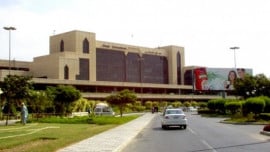
KARACHI: International Centre for Chemical and Biological Sciences (ICCBS) at the University of Karachi (KU) is the first institute in Pakistan to be recognised by the United Nations Educational, Scientific and Cultural Organisation (Unesco). The centre was designated as a Unesco category-2 institute in August 2015.
“Students own the opportunity to be a part of this internationally famous research establishment,” said ICCBS director Prof Dr Muhammad Iqbal Chaudhary on Friday, while addressing an orientation class held for the new students enrolled for MPhil and PhD programme of 2016.
To be a part of Unesco is an honour, not only for KU but also for Pakistan, said Chaudhary.

ICCBS is among the leading centres of excellence in chemical, biological and biochemical sciences in Pakistan, he continued. It is serving as a centre for research and training of scholars from various countries of the world. The facilities at ICCBS are at par with good research establishments in the West, he added.
What is a Unesco Category-2 Institute?
There are two types of institutes in the Unesco network, category-1 and category-2 institutes. Category-1 institutes are Unesco’s own centres, while all other institutes that already exist in other parts of the world and have been recognised by Unesco through inclusion in its network, are called Category-2 institutes. “Unesco recognises already existing centres after a thorough process,” Chaudhary explained.
Getting selected
Every institute sends in requests to the Ministry of Science and Technology of Pakistan and the Higher Education Commission (HEC) after which it nominates only one centre to the UN body in Paris. After the nomination, the UN executive council goes through the application and sends a delegation to visit the centre for a feasibility and relevance check in terms of their work. “This visit is mainly to check whether the institute is able to help other centres in their network all over the world or not,” pointed out Chaudhary. The Unesco delegation visited ICCBS in June 2015, he informed.
“The final decision was taken in the UN general assembly as a formality,” Chaudhary said. Unesco completed its procedures by August 2015, he said. “When the delegation visited in June 2015, former HEC chairperson Prof Dr Attaur Rahman briefed them about the significant progress and researches made by ICCBS during the last few decades,” he said.
How it will help Pakistan?
“Being a part of Unesco’s network will help us learn a lot from them, said Chaudhary, adding that Unesco has many good centres in their network that will help ICCBS in its on-going researches on Hepatitis and other infectious diseases. This designation will allow ICCBS to send their students and researchers to international centres. “Students will be able to enhance their skills and learn from international centres of chemical and biological sciences,” he added.
Published in The Express Tribune, July 30th, 2016.


































1713509570-0/Taylor-Swift-Album-Release-(1)1713509570-0-270x192.webp)
















COMMENTS
Comments are moderated and generally will be posted if they are on-topic and not abusive.
For more information, please see our Comments FAQ